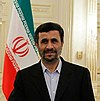Mohammad Jahromi (born 1958) is a former Iranian governor and politician who served as minister of labor and social affairs from 2005 to 2009.
Early life and education
Jahromi was born in Tehran in 1958.[1][2] He holds a bachelor's degree and a master's degree in public administration which he obtained in 1993 and 1997, respectively.[2] He also received a PhD in strategic management in 2005.[1][2]
Career
Jahromi was the deputy chairman for executive affairs of the Guardian Council.[3] He was also one of the founding members of the IRGC in the provinces of Gilan and Mazandaran in 1979.[3] He acted as an IRGC commander in Noor. In addition, he served as the governor of different provinces, including Zanjan (1982-1984), Lorestan (1984-1989) and Semnan (1984-1999).[1] He was among the members of secretariat of the State Expediency Council.[3]
On 24 August 2005, he became the minister of labor and social affairs in the first cabinet of Mahmoud Ahmedinejad.[4] He was approved by the Majlis with 197 votes in favor.[5] He was succeeded by Reza Sheykholeslam in August 2009 as minister of labor and social affairs.[6]
Immediately after his removal from office, Jahromi was appointed deputy of the judiciary chief, Sadeq Larijani, in August 2009.[7] Next Jahromi was named chief of the state-run Bank Saderat.[2] He was removed from office following his involvement in a financial scandal.[2]
Sanctions
Jahromi was sanctioned by the European Union on 1 December 2011 due to his presidency at the Saderat Bank, which was also sanctioned by the Union.[8] He was omitted from the sanction list in October 2012.[9]
Personal life
Jahromi is the son-in-law of Ali Akbar Nategh Noori.[2][10]
References
- ^ a b c "Iran cabinet: Biography of proposed labour minister". BBC. 14 August 2005. Retrieved 16 February 2013.
- ^ a b c d e f Mehrzad Boroujerdi; Kourosh Rahimkhani (2018). Postrevolutionary Iran: A Political Handbook. Syracuse, NY: Syracuse University Press. pp. 522, 645. doi:10.2307/j.ctt20p56tf. ISBN 978-0-8156-5432-2.
- ^ a b c "18 of Iran's 21 new ministers hail from Revolutionary Guards, secret police". Iran Focus. 14 August 2005. Retrieved 16 February 2013.
- ^ "Controversy". PBS. 29 September 2011. Retrieved 16 February 2013.
- ^ "Iran: 17 proposed ministers receive votes of confidence, 4 rejected". Payvand. 25 August 2005. Archived from the original on 17 November 2022. Retrieved 1 July 2013.
- ^ Hossein Alizadeh (16 August 2011). "The Best Government from Constitutional Revolution to Date!". Iran Briefing. Retrieved 16 February 2013.
- ^ "Larijani and Ahmadinejad to shuffle ministers". Etemad-e Melli. 19 August 2009. Retrieved 8 March 2013.
- ^ "Council Decision 2011/783/CFSP". EU Official Gazette. 2 December 2011. Retrieved 1 August 2013.
- ^ "Persons referred to at point (2) of Article 1". EU Official Gazette. October 2012. Retrieved 16 February 2013.
- ^ "Latest from Iran". EA World View. 28 September 2011. Retrieved 18 February 2013.
External links
 Media related to Mohammad Jahromi at Wikimedia Commons
Media related to Mohammad Jahromi at Wikimedia Commons




Recent Comments